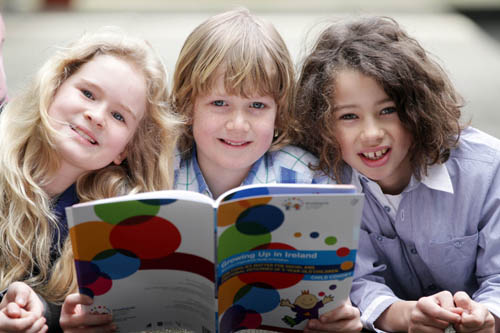New Report on Children’s Social and Emotional Well-Being Launched
Posted on: 08 March 2012
The National Longitudinal Study of Children published a new report from the study on how families matter for children’s social and emotional well-being. The report was launched by the Minister for Children and Youth Affairs, Frances Fitzgerald, TD on Thursday March 8th.
Growing up in Ireland – How Families Matter for Social and Emotional Outcomes of 9-Year-Old Children explores how children in Ireland are faring in terms of their social and emotional well-being. It examines the links between what goes on within the family, such as parenting, the quality of the parent-child relationship, parental depression and marital satisfaction, and children’s social and emotional development. The report also looks at the extent to which children’s outcomes differ according to family structure and social-class background.

(l-r) 9 year olds Finian McCoy, Brianna Treacy, and Calem Abeton pictured at the launch of the latest report from Growing Up in Ireland – How Families Matter for Social and Emotional Outcomes of 9 Year old Children which examines links between parenting styles, relationships, parental depression and marital satisfaction and children’s social and emotional development.
The findings are based on data from the first round of interviews with 8,500 nine-year-old children as well as interviews with their parents, teachers and principals. Interviewing took place from September 2007 to June 2008. Now that they have turned 13 years of age these children, and their families, are currently taking part in a follow-up interview. (A full download of the report and the executive summary can be found at https://www.growingup.ie/growing-up-in-ireland-publications/).
Key findings include:
– The majority of nine-year-olds are developing well without any significant social, emotional or behavioural problems. Approximately 15% – 20% of children were classified as showing significant levels of emotional or behaviour problems.
– Girls were more likely than boys to have problems of an emotional nature (like feeling anxious or sad) while boys were more likely than girls to have problems of a behavioural nature (like fighting with others or being hyperactive). In general, boys display more difficulties overall.
– The style of parenting adopted by parents and the quality of the parent-child relationship were associated with social and emotional outcomes. Children whose parents used an authoritarian parenting style (a high level of control combined with a low level of support for the child) had more difficulty, as did children whose parents were neglectful (a low level of control combined with a low level of support for the child).
– Children who experienced high levels of conflict with their mothers and fathers displayed more social and emotional difficulties.
– Mother-child closeness was important for girls’ social and emotional outcomes but not for boys. Levels of closeness between children and their fathers did not predict social and emotional problems.
– Parents’ psychological well-being and the quality of the relationship between parents matters for children’s social and emotional development. Parent-child conflict was higher in situations where mothers and fathers had experienced depression, and where mothers and fathers were dissatisfied in their relationship with each other.
– Mothers’ depression and marital satisfaction were associated with difficulties for children, but this was largely due to the knock-on effect on the mother-child relationship. Fathers’ depression and marital satisfaction were not directly related to children’s difficulties.
– Certain inherent characteristics of children make them more vulnerable than others to having poor social and emotional outcomes. Children who are highly emotional or react intensely when they get upset displayed more negative outcomes. Nine-year olds who have a chronic illness are more likely to have higher levels of social and emotional problems.
– Children in single-parent households and in more economically disadvantaged families displayed higher levels of social and emotional problems. However, the associations were small, once child characteristics and parenting were accounted for. Coming from a lower socio-economic background or single-parent family may increase a child’s risk for poorer social and emotional outcomes. However, processes within the family and child characteristics remain the most important predictors of children’s social and emotional outcomes.
Speaking at the event the Minister for Children and Youth Affairs, Frances Fitzgerald TD said: “The report confirms what we already know. The quality of family relationships and factors within the home impact hugely on children’s development. Good parenting is crucial for children’s outcomes and that is why this Government is committed to helping parents ensure their child gets the best start in life. It is with this in mind that I have prioritised support for families and parents, in particular those who may be facing periods of difficulty or trouble.”
Also speaking at the launch, the report author, Dr Elizabeth Nixon, Lecturer in Developmental Psychology at Trinity College Dublin said: “Children display individual differences in their risk of experiencing social and emotional problems. Some of this risk may be due to the child’s nature, but what goes on within the family has a very important role to play. The quality of parent-child relationships and in particular children’s conflict with mothers and fathers represents a significant risk for their psychological well-being. Children can also be affected by other things that happen in the family, such as maternal depression, marital dissatisfaction, and economic disadvantage, but children can be buffered from the potentially negative influence of these factors if a positive parent-child relationship can be maintained.”
Growing Up in Ireland is a Government funded study following the progress of almost 20,000 children and their families – a Child Cohort of 8,500 children interviewed at nine years and 13 years of age and an Infant Cohort of 11,100 children participating at nine months and three years of age. The study is being conducted by a consortium of researchers led by the Economic and Social Research Institute (ESRI) and Trinity College Dublin. Those wishing to find out more about the study or today’s event can visit the study’s website www.growingup.ie
